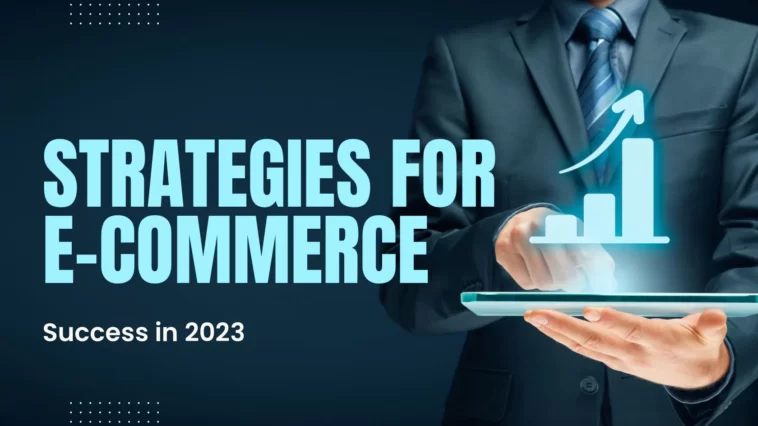The world of e-commerce has become increasingly competitive, with businesses vying for consumers’ attention and loyalty. To stand out from the crowd and achieve success in 2023, it’s essential for online retailers to adopt effective strategies that cater to evolving consumer needs and preferences. In this article, we will explore fifteen top strategies that can help businesses thrive in the e-commerce landscape of 2023.
In the digital age, e-commerce has become a crucial channel for businesses to reach customers and drive revenue. With the growing popularity of online shopping, it’s imperative for e-commerce businesses to stay ahead of the curve and employ strategies that ensure success. This article aims to provide valuable insights and actionable tips to help businesses achieve e-commerce success in 2023.
Read more: Proper Address Verification Is Vital for E-Commerce Companies in 2023
Developing a Mobile-First Approach
Table of Contents
- 1 Developing a Mobile-First Approach
- 2 Implementing Personalization and Customization
- 3 Enhancing User Experience with Seamless Navigation
- 4 Optimizing Product Pages for Conversions
- 5 Leveraging Social Media Marketing
- 6 Implementing an Effective SEO Strategy
- 7 Building Trust and Security
- 8 Utilizing Email Marketing for Customer Retention
- 9 Embracing Omnichannel Retailing
- 10 Analyzing and Optimizing Performance
- 11 Customer Support and Communication
- 12 Adapting to Emerging Technologies
- 13 Scaling and Expanding Operations
- 14 Conclusion
- 15 FAQs

In 2023, mobile shopping continues to dominate the e-commerce landscape. Therefore, adopting a mobile-first approach is paramount. Businesses should focus on mobile optimization, ensuring their websites and online stores are responsive, load quickly, and provide an excellent user experience across various devices.
Implementing Personalization and Customization
To stand out from the competition, businesses need to personalize the shopping experience foreach customer. Leveraging customer data and utilizing technologies like artificial intelligence, businesses can tailor product recommendations, offers, and content to individual preferences, increasing customer engagement and satisfaction.
A seamless and intuitive website navigation is crucial for keeping customers engaged and reducing friction in the buying process. Simplifying the website structure, streamlining the checkout process, and offering multiple secure payment options can significantly improve the user experience and increase conversion rates.
Optimizing Product Pages for Conversions
Product pages play a vital role in driving conversions. Compelling product descriptions that highlight unique selling points, accompanied by high-quality images and videos, help customers make informed purchasing decisions. Integrating social proof, such as customer reviews, further enhances trust and credibility.
Leveraging Social Media Marketing
Social media platforms have become powerful marketing channels. Engaging with customers on social platforms, collaborating with influencers, and leveraging user-generated content can significantly boost brand visibility, drive traffic, and increase sales.
Implementing an Effective SEO Strategy
Search engine optimization (SEO) remains critical for e-commerce success. Conducting thorough keyword research, optimizing website structure and URLs, and creating valuable content, including blog posts, help businesses rank higher in search engine results, driving organic traffic and improving visibility.
Building Trust and Security

Building trust with customers is essential for e-commerce success. Displaying trust signals, such as security badges and customer testimonials, helps establish credibility. Implementing robust security measures to protect customer data and providing transparent policies instill confidence in shoppers.
Utilizing Email Marketing for Customer Retention
Email marketing is a powerful tool for customer retention. Building an email list, segmenting subscribers, and personalizing email campaigns based on customer preferences can drive repeat purchases, foster loyalty, and provide exclusive discounts and promotions to incentivize continued engagement.
Embracing Omnichannel Retailing
In the omnichannel era, integrating online and offline channels is crucial. Offering click-and-collect services, same-day delivery options, and ensuring consistent branding and customer experiences across all touchpoints provide convenience and enhance customer satisfaction.
Analyzing and Optimizing Performance
Tracking key performance indicators (KPIs) and utilizing analytics tools help businesses gain valuable insights into their e-commerce performance. Conducting A/B testing, optimizing conversion rates, and continuously refining strategies based on data-driven insights lead to improved results and growth.
Customer Support and Communication
Prompt and helpful customer support is a differentiating factor for e-commerce businesses. Offering live chat and integrating chatbots to provide instant assistance, proactively communicating with customers regarding order status or promotions, and resolving issues swiftly create positive customer experiences.
Adapting to Emerging Technologies
Staying ahead of the curve requires embracing emerging technologies. Artificial Intelligence (AI) and machine learning can automate processes, improve personalization, and enhance customer interactions. Voice search and virtual assistants provide new avenues for engaging with customers, while Augmented Reality (AR) and Virtual Reality (VR) offer immersive shopping experiences.
Scaling and Expanding Operations
As e-commerce businesses grow, scaling and expanding operations becomes crucial. Streamlining inventory management, optimizing fulfillment and shipping processes, and considering international expansion strategies can help businesses meet increasing demand and reach new markets.
Read more: Tips for SEO on e-commerce website
Conclusion
In conclusion, success in e-commerce in 2023 requires businesses to adapt and implement effective strategies that cater to evolving customer preferences. From adopting a mobile-first approach to personalizing the shopping experience, optimizing SEO, and embracing emerging technologies, each strategy contributes to creating a competitive advantage. By prioritizing customer satisfaction, providing seamless user experiences, and staying abreast of industry trends, businesses can thrive in the dynamic world of e-commerce.
FAQs
How can I optimize my e-commerce website for mobile users in 2023?
Ensure your website is responsive and loads quickly on mobile devices.
Optimize images and use lazy loading techniques.
Simplify the checkout process and provide multiple secure payment options.
What role does social media marketing play in e-commerce success?
Social media marketing helps businesses engage with customers, drive brand visibility, and increase sales.
Collaborating with influencers, leveraging user-generated content, and running targeted ad campaigns can yield significant results.
Why is personalized marketing important for e-commerce success?
Personalized marketing improves customer engagement, increases conversions, and fosters loyalty.
By leveraging customer data and technologies like AI, businesses can tailor product recommendations, offers, and content to individual preferences.
How can I improve my e-commerce website’s SEO?
Conduct keyword research to identify relevant and high-volume search terms.
Optimize website structure, URLs, meta tags, and headings.
Create valuable content, including blog posts, that incorporates relevant keywords.
What are some effective customer retention strategies for e-commerce?
Build an email list and segment subscribers for personalized campaigns.
Provide exclusive discounts, promotions, and loyalty rewards.
Regularly communicate with customers through targeted email marketing and personalized offers.




